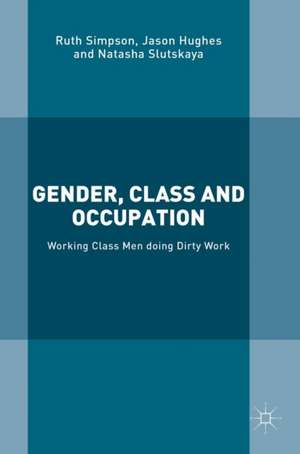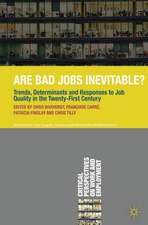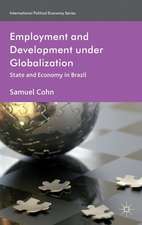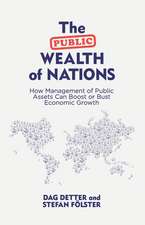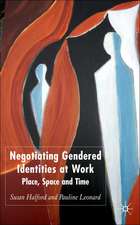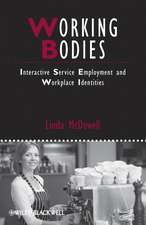Gender, Class and Occupation: Working Class Men doing Dirty Work
Autor Ruth Simpson, Jason Hughes, Natasha Slutskayaen Limba Engleză Hardback – 28 sep 2016
Preț: 728.28 lei
Preț vechi: 888.14 lei
-18% Nou
Puncte Express: 1092
Preț estimativ în valută:
139.36€ • 143.99$ • 115.93£
139.36€ • 143.99$ • 115.93£
Carte tipărită la comandă
Livrare economică 19 martie-02 aprilie
Preluare comenzi: 021 569.72.76
Specificații
ISBN-13: 9781137439673
ISBN-10: 113743967X
Pagini: 263
Ilustrații: VII, 277 p. 7 illus. in color.
Dimensiuni: 148 x 210 x 22 mm
Greutate: 0.46 kg
Ediția:1st ed. 2016
Editura: Palgrave Macmillan UK
Colecția Palgrave Macmillan
Locul publicării:London, United Kingdom
ISBN-10: 113743967X
Pagini: 263
Ilustrații: VII, 277 p. 7 illus. in color.
Dimensiuni: 148 x 210 x 22 mm
Greutate: 0.46 kg
Ediția:1st ed. 2016
Editura: Palgrave Macmillan UK
Colecția Palgrave Macmillan
Locul publicării:London, United Kingdom
Cuprins
Chapter One: Introduction-. PART ONE: Theories and Concepts: Dirt, Gender and Class-. Chapter Two: Embodying Dirty Work-. Chapter Three: Dirt in Material Worlds-. Chapter Four: Dirt as Relational-. Chapter Five: White Working Class Masculinities and Dirty Work-. PART TWO: Occupational Contexts-. Chapter Six: Notions of Sacrifice: The Meanings Butchers give to their Work-. Chapter Seven: Paradoxes of Recognition and Dirty Work-. Chapter Eight: Resistance in Dirty Work: Street Cleaners and Refuse Collectors-. Chapter Nine: Space, Place and Dirty Work: The Experiences of Street Cleaners, Refuse Collectors and Graffiti Removers-. Chapter Ten: Emotional Dimensions of Dirty Work: Butchers and the Meat Trade-. Chapter Eleven: Researching Dirty Work-. Chapter Twelve: Conclusion-. References-.
Notă biografică
Ruth Simpson is Professor of Management at Brunel Business School, UK. Her research interests include dirty work, gender and organizations, gender and careers, and emotions in organizations. She has recent publications in Organization, Gender Work and Organization, Human Relations, Work Employment and Society and British Journal of Management.
Jason Hughes is Professor and Head of Sociology at the University of Leicester. His research interests include problematised consumption; drugs, addiction and health; emotions, work and identity; figurational sociology and sociological theory; methods and methodology; moral panics and regulation. Authored and co-authored/edited works include Norbert Elias and Modern Sociology: Knowledge, Interdependence, Power, Process (Bloomsbury 2013); Visual Methods (Sage, 2012);Internet Research Methods (Sage, 2012); Documentary and Archival Research (Sage, 2014); Moral Panics in the Contemporary World (Bloomsbury, 2013), and Communities of Practice: Critical Perspectives (Routledge, 2007).
Natasha Slutskaya is a Lecturer of Organization Studies at Brunel Business School, UK. Her research interests include organizational identity and creativity and embodiment. She has recent publications in Organization, Qualitative Research in Management and Organizations and Work Employment and Society.
Jason Hughes is Professor and Head of Sociology at the University of Leicester. His research interests include problematised consumption; drugs, addiction and health; emotions, work and identity; figurational sociology and sociological theory; methods and methodology; moral panics and regulation. Authored and co-authored/edited works include Norbert Elias and Modern Sociology: Knowledge, Interdependence, Power, Process (Bloomsbury 2013); Visual Methods (Sage, 2012);Internet Research Methods (Sage, 2012); Documentary and Archival Research (Sage, 2014); Moral Panics in the Contemporary World (Bloomsbury, 2013), and Communities of Practice: Critical Perspectives (Routledge, 2007).
Natasha Slutskaya is a Lecturer of Organization Studies at Brunel Business School, UK. Her research interests include organizational identity and creativity and embodiment. She has recent publications in Organization, Qualitative Research in Management and Organizations and Work Employment and Society.
Textul de pe ultima copertă
This insightful new study explores an emerging and growing interest in Sociology and Organization Studies which concerns the meanings and experiences of ‘dirty’ work. Based on a unique study of male street cleaners, refuse collectors, graffiti removers and butchers, and drawing on Bourdieu as a theoretical frame, it presents an ‘embodied’ understanding of ‘dirty’ work. Gender, Work and Occupation explores new avenues of workplace studies, highlighting how material conditions both support and constrain processes of occupation-based ideological constructions. Using original field research, the authors put forward a different agenda in terms of how we think about dirty work, and how we can explore and understand the ‘lived experiences’ of dirty workers.
